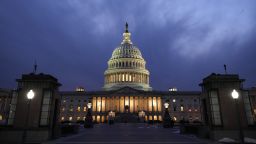With one week to go before Georgia’s Senate runoff, heavy hitters and big dollars from both national parties are pouring into the state for a race that will determine the balance of power in the Democratic-controlled Senate next year.
But the most sought-after stamp of approval belongs to Republican Gov. Brian Kemp, who was comfortably reelected to a second term this month after defying a Donald Trump-backed primary challenge earlier in the year.
Republican Senate nominee Herschel Walker has Kemp’s endorsement and, in the final stretch, television commercials and a live, side-by-side appearance to show for it. Democratic Sen. Raphael Warnock, though, has been busy telling Georgia voters that they don’t have to choose between him and Kemp. The incumbent, who’s running for a full six-year term, has run ads and hosted an event starring “crossover voters” – or people who cast a ballot for the governor and who have said they plan to do the same for Warnock on December 6.
“Warnock’s got a lot of resources. He can do whatever he wants, but at the end of the day, I don’t think any of that stuff matters,” Kemp said in a “CNN This Morning” interview with Kaitlan Collins that aired Tuesday. “It matters what people think and what they’re dealing with in their everyday lives. And I know people are dealing with 40-year high inflation. I know that they know that the border is a disaster, and you got Joe Biden saying after the November election he’s not going to change a thing.”
The candidates’ appeals to Kemp supporters not only underscores the governor’s popularity in Georgia, but the power of moderate swing voters expected to decide whether Warnock wins a full term or Walker unseats him. Republicans swept the races for statewide seats in Georgia earlier this month. Walker, meanwhile, was outpaced by Kemp in total votes by more than 200,000 – which either signals he has room to grow his share or that he’s already been written off by otherwise Republican-leaning voters.
Kemp is trying to help Walker claw back or draw out voters who either rejected the nominee on Election Day or passed over the Senate race.
After previously lending his turnout apparatus to national Republicans, he has now cut two ads for Walker, including a fresh one this week. The 30-second spot includes video of Kemp on the trail with Walker and the governor saying, “It is time to retire Raphael Warnock and send Herschel Walker to the United States Senate.”
Kemp also appears in a mailer from a pro-Walker super PAC that tells voters, “You stopped Stacey (Abrams). Now reject Warnock.”
Kemp defeated Abrams in a rematch of their 2018 contest by nearly 300,000 votes.
The stakes
If the Republican prevails, the parties will again split the Senate 50-50, with Vice President Kamala Harris providing a tie-breaking vote and Democrats the slightest possible advantage.
Democrats will control the chamber after the party’s incumbents held their ground and Pennsylvania’s John Fetterman picked up a seat held by retiring GOP Sen. Pat Toomey. But this is still a race full of consequences. In the short term, a Warnock victory would deliver more power to Democrats as they seek a firmer grip on the procedural life of the Senate, which could help them confirm more Biden nominees in a more expeditious manner. West Virginia Sen. Joe Manchin would also lose some of his leverage, if Majority Leader Chuck Schumer had a vote to spare, which could hold added significance given Manchin is facing reelection in 2024.
Senate Minority Whip John Thune, a South Dakota Republican, spelled out the stakes on Monday.
“Having an evenly divided Senate means that you get equal representation on committees,” Thune said. “We’ve been successfully able to bottle up some bad nominees at the committee level. So (the Georgia race has) got real consequences.”
Thune also conceded that his party could use a morale boost after underperforming expectations in the midterms, despite narrowly gaining control of the House.
“It’d be nice to get a win on the books, and especially in a state like Georgia, where, frankly, we think we should be winning,” Thune said.
Beyond that, looking ahead to the next election in 2024, Republicans – already with a more favorable map than this year – would be better positioned to win back a majority, perhaps a significant one, if Walker can pad their numbers now.
Early voting surges as outside support ramps up
Top party officials, donors and voters hardly need convincing.
More than 150,000 people cast ballots over the weekend, including more than 70,000 on Saturday following a failed Republican court challenge arguing the polls should be closed because it followed a holiday. Late on Monday, Georgia’s second-ranking election official, Gabriel Sterling, tweeted that the state had broken a single-day record, with more than 300,000 people early voting on Monday.
Overall, more than 500,000 votes have already been cast ahead of next week’s Georgia runoff election, according to data from the Georgia Secretary of State’s office. About 470,000 of those votes have been cast during in-person early voting.
While some counties held early voting last week or over the weekend, every county is required to hold early voting Monday through Friday of this week. The condensed time frame leading up to the runoff means there are fewer days of early voting than there were before the general election.
Even as the votes come in, both candidates are still ramping up to Election Day. For Warnock, that means another visit from former President Barack Obama, who will be in Atlanta on Thursday. The senator was joined on the stump by New Jersey Sen. Cory Booker over the weekend and welcomed musician Dave Matthews to a Monday night rally.
On Tuesday, Walker will welcome Republican National Committee chair Ronna McDaniel and Oklahoma Sen.-elect Markwayne Mullin. Texas Sen. Ted Cruz and South Carolina Sen. Lindsey Graham have also been out in force for Walker, who finally shared a stage with Kemp 10 days ago.
The stakes are such that even the parties’ most powerful figures are making tough decisions in order to help their side gain any advantage – or, in the cases of President Joe Biden and former President Trump – be careful to do no harm.
Both Trump and Biden have steered clear of Georgia, where neither is popular with those decisive swing voters, during the campaign. Trump, who recruited Walker to run and has been a consistent supporter, will not appear in the state ahead of the December 6 election, a person close to Walker confirmed to CNN.
Many Republicans also blame Trump’s false claims about the 2020 election in Georgia for their defeat in the January 2021 runoffs, when then-GOP Sens. David Perdue and Kelly Loeffler lost to Democrats Jon Ossoff and Warnock, respectively.
Trump is also now under fire for dining last week with prominent White nationalist and Holocaust denier Nick Fuentes. Asked about that meeting by CNN’s Collins, Kemp – who had already broken with Trump over the 2020 election – initially pointed to a previous denunciation before again questioning Trump’s actions.
“That was a bad decision. There’s no place for that in the Republican Party,” Kemp said. “And (Trump’s) got, you know, his answer to that question, and I’ll let him speak to that. But my views on that are very clear.”
Some Republican operatives in Georgia were hopeful that Florida Gov. Ron DeSantis, a potential presidential candidate who, like Kemp, was just reelected, would make an appearance for Walker, but that doesn’t appear to be in the cards, the source said.
One potential reason why: Other GOP operatives in Georgia told CNN they had raised the point that a DeSantis visit might effectively provoke Trump into holding a rally over the concerns of Republicans in Georgia and around the country.
Biden, too, is steering clear, though there has been less agitation around his decision.
Republicans have spent much of the race hammering Warnock over his record of consistently voting for the president’s legislative agenda. Warnock, in turn, has sought to highlight his bipartisan work in the Senate and has steadfastly kept his distance from any potentially divisive figures in his party.
His party, though, hasn’t been shy in spending on Warnock’s behalf.
Though the official Democratic Senate campaign arm has only spent about $40,000 on television and digital ads ahead of the runoff, Democrats on the whole – led by Georgia Honor, which is funded by the Democratic Senate Majority PAC – has already invested $14.4 million. (The Democratic Senatorial Campaign Committee announced a $7 million investment in field operations once the runoff was confirmed earlier this month.)
It’s a roughly similar story on the Republican side, where the National Republican Senatorial Committee has spent just over $500,000, considerably less than the GOP’s Senate Leadership Fund, a super PAC closely tied to Minority Leader Mitch McConnell, which has so far shelled out about $11.5 million.
That figure could rise in the coming days if SLF stretches to reach its previously announced plans to spend more than $14 million on the race.
And as money continues to pour into Georgia, a pair of ads launched this week reflect the increasingly negative tone of runoff, with each campaign seizing on personal attacks to make the case to voters in the final week.
Walker’s campaign aired a new TV spot Tuesday morning that features clips from a police interview with Warnock’s ex-wife, who accused him of running over her foot with his car in March 2020, though no charges were filed.
“Find out who Reverend Warnock really is,” the ad’s narrator says.
Meanwhile, Warnock’s campaign launched a new TV ad on Monday that features several people reacting to clips of Walker on the campaign trail, delivering off-topic, meandering remarks on vampires versus werewolves, and complaining about “bad air” from China.
“It is embarrassing,” one viewer says. “Let’s call it what it is. It is embarrassing.”
This story has been updated with additional reaction.
CLARIFICATION: This story has been updated to provide more details on what the Democratic Senatorial Campaign Committee has spent on ads and field operations for the runoff.
CNN’s Ethan Cohen contributed to this report.


























